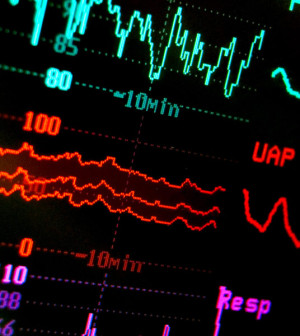- Could Your Grocery Store Meat Be Causing Recurring UTIs?
- Are You Making This Expensive Thermostat Error This Winter?
- Recognizing the Signs of Hypothyroidism
- 10 Strategies to Overcome Insomnia
- Could Artificial Sweeteners Be Aging the Brain Faster?
- Techniques for Soothing Your Nervous System
- Does the Water in Your House Smell Funny? Here’s Why
- Can a Daily Dose of Apple Cider Vinegar Actually Aid Weight Loss?
- 6 Health Beverages That Can Actually Spike Your Blood Sugar
- Treatment Options for Social Anxiety Disorder
Weightlessness in Space May Lower Blood Pressure in Astronauts


Spending a long time in space lowers blood pressure in astronauts, but it could also strain their hearts, a new study indicates.
The researchers, from the National Aeronautics and Space Administration (NASA), looked at eight astronauts who were checked before, during and after three to six months of spaceflight.
The shift of blood and fluid from the lower to the upper body caused by weightlessness was much higher than previously thought. Blood volume burden to the heart was also more than expected, although the heart rate remained the same.
The researchers found that long-term spaceflight led to a 10 mmHg reduction in blood pressure, which is about the same decrease usually achieved when taking medication to lower high blood pressure.
The findings were published online this week in The Journal of Physiology.
“The discovery is important because during long-duration missions, the blood volume burden to the heart could constitute a health problem during future long-duration missions,” study author Dr. Peter Norsk, chief scientist in the division of space life sciences at NASA’s Universities Space Research Association, said in a journal news release.
“We know that some astronauts experience vision problems some months into spaceflight and this may in fact be caused by the augmented fluid and blood volume shift to the upper body,” he said.
“Although the blood volume burden to the heart is higher than expected, blood pressure is lower because the blood vessels are more relaxed [dilated]. This is actually good for the body and the blood vessels…. In the future, the spaceflight factors that induce the fluid shifts and relaxation of the blood vessels should be identified,” Norsk concluded.
More information
The European Space Agency has more about living in space.
Source: HealthDay
Copyright © 2026 HealthDay. All rights reserved.










